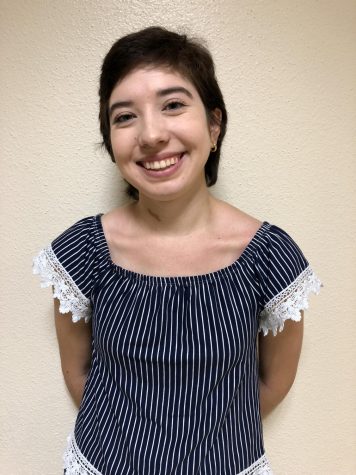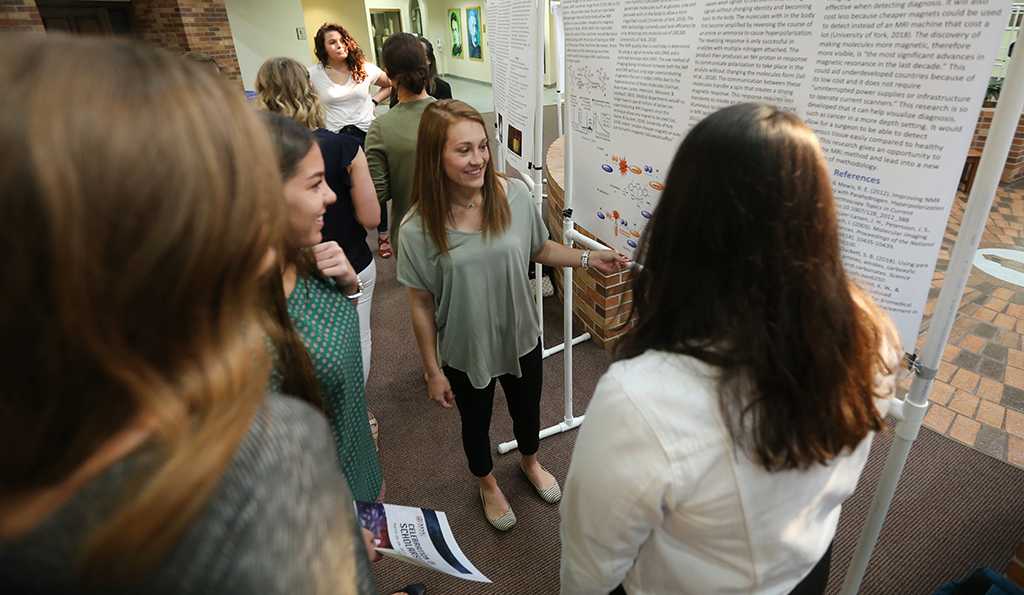EURECA proposal on Russian literature one of 27 awarded for fall
September 5, 2018

Lane Riggs, English senior, dedicated 15 additional hours of research and study each week to her Enhancing Undergraduate Research Endeavors and Creative Activities project which discussed Russian literature and Soviet government — “Annotated Translation of Zamyatin’s We with Scholarly Apparatus.”
“It was actually not my idea. It was a professor’s,” Riggs said. “She wanted to translate another Russian book and asked me to help. We did really well throughout the semester and she asked me if I would like to [continue] to help and I told her ‘Yes’ so I wrote the proposal [after the EURECA forum].”
And this fall, Riggs’ project, a continuation of her project from last spring, was one of 27 approved for funding as part of fall EURECA program.
Kirsten Lodge, associate professor and humanities project coordinator, is Riggs’s mentor and prompter for her EURECA research. Lodge said she became interested in Russia and Russian politics in high school then majored in Russian literature as an undergrad student in college.
“I decided to learn Russian [while] majoring in Russian and Soviet studies,” Lodge said. “Lane has been helping me with the background materials with the Soviet dystopian book called We. She’s been a student of mine for a while and I took her to a conference called ‘The Association of Cortex and Courses’ where I found that we worked well together. She’s very good at taking advice so she was my top choice when I was looking for help with this project.”
Riggs said when the EURECA forum was coming up she was nervous because of the numerous people who came to see her present her work.
“I felt a lot of relief when I had finished my work,” Riggs said. “I was very proud of my poster. I went around and listened to others’ presentations and I noticed most were math and science posters, so I thought it was really good that I was there as one of the only english posters to kind of even it out. I didn’t get a lot of feedback when I presented at the forum, but when I sent in the proposal [in May] and received my rating, high scores and acceptance that was great.”
Magaly Rincon-Zachary, biology professor and director of undergrad research, said when reviewing proposals a rubric is used for evaluation of the proposal and application sent in from the student.
“It’s putting numbers to the qualitative part of what this is so there is a final score,” Rincon-Zachary said. “The rubric is based on 28 total points and the minimum to be accepted into the program is 23. Based on that score, we rank the students’ work and that is how we award the scholarship to students.”
Lodge said continuation of interest in helping research the background of this book was Lane’s idea.
“I really like that she’s very enthusiastic about trying new things,” Lodge said. “I wasn’t surprised when I heard she was one of the chosen students to be awarded. She’s reliable, a good researcher, she always came up with something and will make for an excellent grad-student. I’m encouraging her to start work on her own project as well.”
Rincon-Zachary said Riggs presented a hard project because of its basis on early Russian literature and the history that is involved with it. She said her impression of Riggs is she enjoyed researching this topic and was acquiring research skills in the process.
“Lane helps Dr. Lodge accumulate research that is not easy to find,” Rincon-Zachary said. “Whenever you translate from one language to another there is some interpretation where language has evolved with time. For example, when a popular phrase meant something 100 years ago, it may mean something else today. It’s very complex work and requires a lot of involvement. Students are not experts, but they are learning to be experts when practicing these kinds of skills.”
Riggs said she decided to join the EURECA forum and send in a proposal because she finds importance and value in campus involvement.
“This [EURECA] is one of the things that I hadn’t done yet and I thought would be good to get under my belt and learn how to be more analytical,” Riggs said. “We all know how to use a library, but I learned how to really take advantage of it. So it’s good to focus on things outside of the classroom because you can learn a lot more from it than you think. Being involved in this has given me a sense of accomplishment since I did well in it and it feels good that I am able to read information and make something out of it.”
FALL 2018 EURECA UNDERGRADUATE RESEARCH PROJECTS
Dillard College of Business Administration
- Simon Ospina, “Economic Impacts of the SBDC at MSU on Regional Economic Growth,” Mentors: Agim Kukeli and James Owen
- Shayne Matambanadzo, “A Comparative Study of the Cashless Societies Progress and its Efficiency,” Mentor: Qian Li
- Hanna Gebel, Luka Gebel, “A simultaneous equation estimation of the effect of remittances on income, education and health inequality in developing countries,” Mentor: Pablo Garcia-Fuentes
Prothro-Yeager College of Humanities and Social Sciences
- Kerdell Cuffy, “Africa and Her Contributions to Civilization,” Mentor: Whitney Snow
- Lane Riggs, “Annotated Translation of Zamyatin’s We with Scholarly Apparatus,” Mentor: Kirsten Lodge
- Frida Arredondo, “How Best to Learn Spanish Vocabulary: Comparing Published Research and Student Surveys,” Mentor: Jeffery Oxford
- Emma Labedis, “Midwestern’s O-Wa-Ki-Ya and the Feminist Rhetorical Perspective,” Mentor: Melissa Nivens
Gunn College of Health Sciences and Human Services
- Stephanie Lindsay, “Empowering Patients to Reduce Lumbar Puncture Associated Spinal Headaches,” Mentors: Stephanie Baker and Robin Lockhart
McCoy College of Science, Mathematics and Engineering
- Natalie Ragland, Anahi Palacios, “Targeting the mdtE gene of E. coli via Cas9/CRISPR to investigate its role in Erythromycin resistance,” Mentor: Jon Scales
- Tarrah Miller, Shanice Toussaint, “Isolation and Molecular Characterization of Antibiotic-Resistant Escherichia coli from Migratory Seagulls and Resident Waterfowl,” Mentor: James Masuoka
- Melissa Rose: “Analysis of the Effect of Yeast Extract Content on Cell Surface Hydrophobicity of Candida albicans,” Mentor: James Masuoka
- Bethany Russell: “Using Sub-inhibitory Pressure of Antibiotics to Reduce Antibiotic Resistance in Escherichia coli QH020816-1.1,” Mentors: James Masuoka and Jon Scales
- Alaska Carrillo-Bell, “Exploring Possible Roles for Bacterial Endophytes in Seeds and Seedlings,” Mentors: Magaly Rincon-Zachary and James Masuoka
- Alexandra Nelson, “Quantitative Analysis of the middle Holliday Creek sub-watershed,” Mentor: Margaret Brown-Marsden
- Constance Anih, Melanie Ronoh, “Data Collection and Analysis from a Wind Turbine and Photovoltaic Solar Panel,” Mentor: Salim Azzouz
- Calvert Aaron, “Comparison of several different hydraulic rapid traverse/feed circuits,” Mentor: Jan Brink
- Jenom Pyeng, “Dynamic Filtration Test to Investigate the Effect of Preformed Gels on Unswept, Low-Permeable Zones/Areas,” Mentor: Mahmoud Elsharafi
- Kelton Vidal, “Energy from Salt Water,” Mentor: Mahmoud Elsharafi
- Joshua Washington, Carson Conrady, “Robot Soccer using Artificial Intelligence, ” Mentors: Yu Guo and Jeong Ok
- Michael Sweeting, “UAV-based Autonomous Payload delivery using Computer Vision,” Mentor: Yu Guo
West College of Education
- Jennifer Cope, “Middle school students today: Are the different from us?”, Mentor: Suzanne Lindt
- Gabrielle Browning, “Movement in the Classroom- Impact on Reading Fluency,” Mentor: Emily Rutherford
- Connie Ginnings, Amanda Latham, “Pre-Service Teachers’ Noticing of Struggling Students’ Mathematical Thinking,” Mentors: Emily Rutherford and Dittika Gupta
- Mackenzie Barnard, “Classroom Management: Engaging Today’s Students in the Elementary Classroom,” Mentor: Jeffrey Blacklock
Fain College of Fine Arts and Gunn College of Health Sciences & Human Services
- Tanner Slavens, Autumn Bellar, Samantha Mitchell, Patrick Rowland, Gwyndalyn Gonzales, “Conceal Reveal,” Mentors: Mandy Sedden, Kimberly Onstott, Morgan Page and Catherine Prose.
West College of Education and Gunn College of Health Sciences and Human Services
- Staci Morgan, Madison Dodd, “Meeting the Needs of Freshman in the Professional Programs of Education and Respiratory Care,” Mentors: Suzanne Lindt and Jennifer Anderson
McCoy College of Science, Mathematics & Engineering and Gunn College of Health Sciences & Human Services
- Julianne Plambeck, May Trinh: “Programming Your Heart,” Mentor: Tina Johnson

